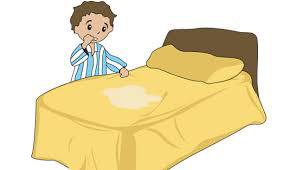
Bedwetting is an extremely common occurrence among children. You may not hear about it as often as other common childhood problems because parents are often embarrassed or ashamed to talk about it. Well, there is nothing to be ashamed of. Bedwetting can be caused by a number of different issues, and identifying those issues promptly can make the problem easier to solve.
Why Do Children Wet the Bed?
There are a number of different reasons why children wet their bed. Physicians have discovered that most of the time, one of the following issues is the cause for bedwetting.
|
CAUSES |
DESCRIPTION |
|
Delayed bladder maturation |
This occurs when the signals between the brain and the bladder during sleep are delayed or slowed for some reason. |
|
Low anti-diuretic hormone (or ADH) |
This problem occurs when the hormone that controls the amount of urine we produce is out of balance. |
|
Deep sleepers |
If your child is a very heavy sleeper, their brain may not receive the signal that their bladder is full. |
|
Smaller functional bladder |
Having a smaller functional bladder means that while your child’s bladder may be a normal size, the brain receives a signal that the bladder is full, even when it is not. |
|
Constipation |
A child who experiences constipation may experience bedwetting due to the pressure placed on the bladder. |
Pediatricians generally consider bedwetting normal for children up to the age of 6. There are many factors that can contribute to the disorder. If your child cannot stay dry through the night after age 6, then consult with your doctor.
How to Stop Children Wetting the Bed
1. Limit Fluid Intake Before Bedtime
Limiting the amount of fluid your child takes in before bedtime can help, but can also be difficult to do. Most pediatricians do not recommend limiting fluids because children tend to see it as a punishment for an issue that is not their fault.
2. Have Toilet Trips Before Bedtime
Make sure your child empties his or her bladder before going to bed. Making sure the bladder is empty can help decrease the chances of having an accident during the night.
3. Use a Bedwetting Alarm
A bedwetting alarm is a device that is worn on the clothing or underwear and linked with an alarm that will alert your child the moment he or she wets the bed. The use of bedwetting alarms has been found to be the most effective tool for long-term success. Many families have found this to be a better solution than reward charts or even medications in some cases.
4. Do Encourage, Do Not Criticize
It is important when addressing the issue of bedwetting that you do not deter your child’s progress by punishing them or criticizing them for bedwetting accidents. Often times, these accidents are out of your child’s control, and demeaning them or making them feel bad about it will only cause more frustration. Encourage your child and always show that you love and support them no matter what.
5. Explain to Your Child
When bedwetting becomes a problem, your child may feel bad or ask you why they are wetting the bed. Explain to them in simple terms that their bladder and their brain aren’t talking to each other correctly and they will need to try some different things to get the two of them communicating more effectively. Never blame your child for bedwetting incidents.
6. Use Bedwetting Products
There are a host of products that can help keep your child dry at night. Although they may not keep your child from wetting the bed, they can limit messes. Waterproof sheets can keep urine from staining the mattress, and absorbent underwear can help your child stay dry at night.
7. Bladder Training
Bladder training involves having your child hold their urine for a few minutes when they feel the need to go. This will strengthen the child’s ability to control the urine flow, which could help them avoid accidents at night.
8. Go and See a Pediatrician
As soon as bedwetting becomes a problem, inform your pediatrician so that they can aid you in monitoring your child’s progress. They will have helpful solutions and be able to evaluate more thoroughly the root cause of the problem.
9. Consider Medication
There are medications that can help with bladder control, but only your pediatrician can determine if they are a suitable choice for your child. The medicines usually only work while your child is actively taking them and bedwetting can start up again after the medications are stopped.
Source: newkidscenter
 FR
FR EN
EN AR
AR








